 Book Now
Book Now
Children’s Dentistry - Murphy, TX
We Love Helping Growing Smiles Shine
At Murphy Dental Home, we believe that lifelong oral health should start as young as possible. In fact, we invite you to bring children one year old and older to come to our dental office for children's dentistry in Murphy, TX. As a mother of two, Dr. Gandhi knows just what to do to help even the rowdiest or shyest child feel comfortable and learn the importance of caring for their teeth and gums. With our patient, compassionate team, your child can feel right at home with us and know the best ways to keep their smile healthy.
Why Choose Murphy Dental Home for Children’s Dentistry?
- Caring Dental Team
- Experienced Dentist, Mother of Two
- Customized Care for Your Child
Non-Nutritive Habits
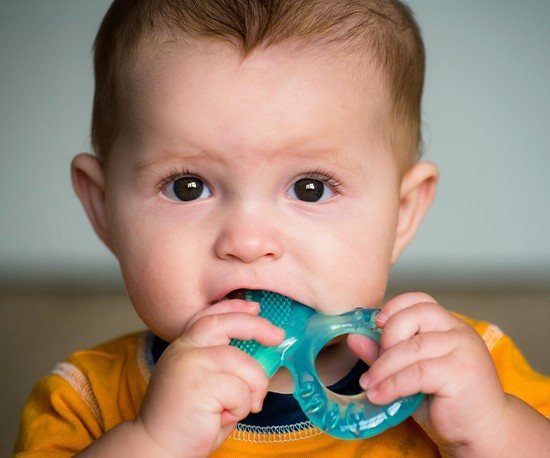
Although habits like sucking on fingers, thumb, or a pacifier can be soothing for infants, if they continue as your child ages, their oral development can suffer as a result. For example, a child can get an overbite as a result of thumb sucking, potentially leading to orthodontic issues down the road. We can offer tips and advice for helping your child end these habits early on and help your child be set up for a healthy smile from the beginning.
Children’s Dental Checkups & Teeth Cleanings
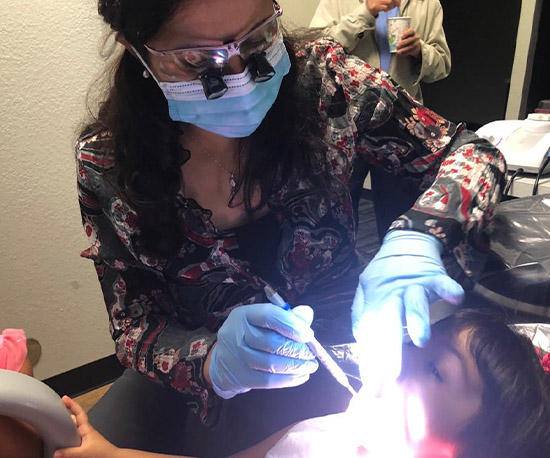
First impressions matter, especially when it comes to children, which is why our team takes the time and effort to make your child’s dental visits as stress free and productive as possible. At first, we’ll spend most of our time getting to know them and helping them feel at ease with our team and check for any cavities. As they become more comfortable with us, we’ll add in cleanings to prevent decay in the future.
Dental Sealants
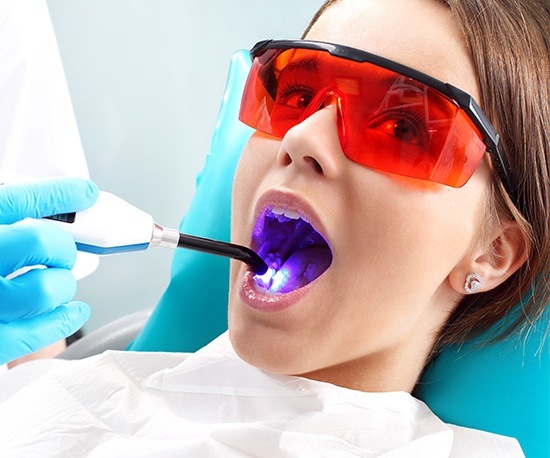
Did you know that most tooth decay occurs on the molars and premolars? These teeth have deep pits for grinding and chewing food, but debris, bacteria, and plaque can easily build up there over time, causing decay. Children can be even more vulnerable to cavities here because they are still learning healthy habits and can miss these areas in their brushing and flossing. After fluoride, dental sealants are one of the most effective ways to prevent cavities by providing a barrier between the enamel and harmful bacteria for up to 10 years at a time.
Athletic Mouthguards / Sportsguards
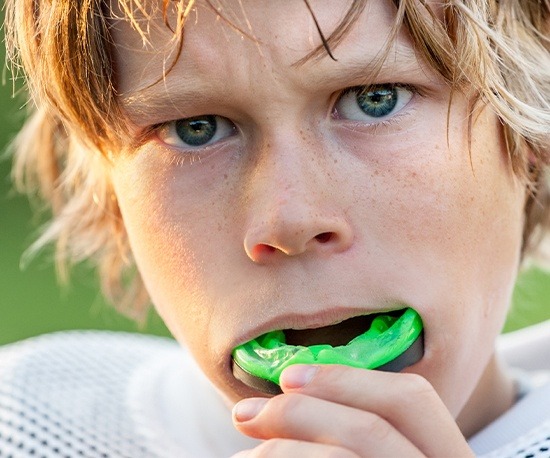
If your child plays sports, it’s important that they wear the right protection. After all, you wouldn’t let them play tackle football without a helmet or pads. These pieces of equipment reduce the risk of injury from an impact. Well, their teeth deserve the same protection! In any sport where hard contact is likely, including football, basketball, soccer, lacrosse, and hockey, your child needs to wear a mouthguard. Unlike store-bought types that don’t fit properly, we can create a customized oral appliance that softens blows to the face and protects teeth.
Silver Diamine Fluoride

Dr. Gandhi always looks for even the very beginning signs of decay. When a cavity is caught early enough, we actually may not have to use a traditional filling to treat the problem. With silver diamine fluoride, we can actually kill the bacteria that are causing the cavity before they damage the tooth’s enamel. As a result, your child retains more of their natural smile and avoids the need for a filling or crown down the road.
Frenectomies/Lip & Tongue-Tie
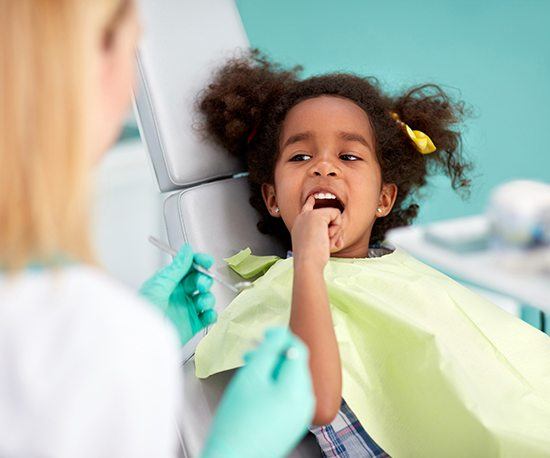
Does your baby struggle to breastfeed? Is speech or eating a challenge? They may have a large or thick frenulum, or tissue that connects the tongue to the floor of the mouth and the upper lip to the upper jaw, and have restricted range of motion. This is often called a tongue or lip tie. Luckily, Dr. Gandhi can perform a simple frenectomy to get rid of a tongue or lip tie. Interested in learning more about this specialized service? Give us a call!
Pulp Therapy
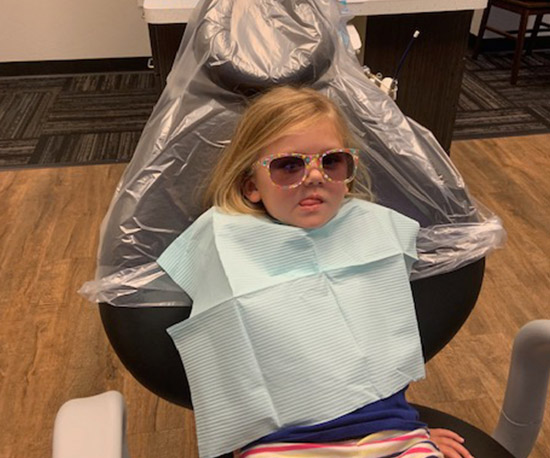
Primary (or baby) teeth have a much thinner layer of tooth enamel than permanent adult teeth, and as a result, they can be more susceptible to deeper, more serious cavities in a short amount of time. When decay has reached the pulp or center of the tooth, it can cause severe pain or infect the nerves of the tooth. Therefore, we can remove the pulp in order to save the entire tooth. Otherwise, extraction may become necessary.
Sedation Dentistry for Children

Some children struggle with dental visits. Some have difficulty sitting still for long periods of time, while others feel anxious because of the unfamiliar surroundings. Regardless of the reason for their discomfort, we want to help your child feel completely at ease in our dental office, which is why we offer sedation options that are gentle and effective. With nitrous oxide, you won’t have to worry about the effects lasting a long time, and your child can leave with positive dental experiences and look forward to their next dental visit.
Children’s Dentistry FAQs

Parenting doesn’t come with an instruction book, so it’s natural to have a few questions about how to best take care of your little one’s smile! At Murphy Dental Home, we’ll be more than happy to help you every step of the way as your child’s precious smile grows. For your convenience, we’ve gathered some of the most common questions we typically receive about children’s dentistry. If you don’t see the answers you’re looking for, don’t hesitate to give us a call!
When Should My Child Start Visiting the Dentist?
According to the American Academy of Pediatric Dentistry, it’s recommended that children begin getting their routine dental checkups before their first birthday or within six months of their first tooth erupting. Starting your child’s regular oral health care this early in life is a great way to prevent dental anxiety and set them up for a lifetime of happy, healthy smiles. It also gives us a chance to spot any issues as early as possible and provide the best preventive care to protect your little one’s developing smile.
Does Thumb-Sucking Influence My Child’s Oral Development?
Thumb-sucking is a natural reflex in children that usually fades by the time they’re six years old. However, if they continue to suck their thumb after the age of six, or if they have aggressive thumb-sucking behavior, they can potentially influence their oral development. The extra prolonged pressure can change how their permanent teeth come in and how their jaws come together, which could require extensive orthodontic treatment in the future to correct. As you bring your son or daughter in for their checkups, we’ll keep a close eye on how their habits are impacting their oral health. If needed, we’ll be happy to offer personalized advice on how to best help your child break this habit and protect their smile.
When Should My Child Start Using Toothpaste?
As soon as a baby tooth erupts, it is vulnerable to cavities. When your child’s teeth start to appear, you can begin cleaning them with a tiny smear of fluoridated toothpaste about the size of a grain of rice. When they turn six years old, they can begin to use a pea-sized drop of fluoridated toothpaste. However, it’s a good idea to keep an eye on them while they brush to ensure that they spit out the excess toothpaste after they brush! While your child learns to brush and floss on their own, we may recommend fluoride treatments and dental sealants. These safe, quick, and comfortable applications can strengthen their teeth and fortify their enamel to help protect against decay as your child develops healthy dental habits.
What Should I Do If My Child Knocks Out a Baby Tooth Unexpectedly?
Your child’s baby teeth aren’t meant to be a permanent addition to their smile. However, if they suddenly or unexpectedly knock out a primary tooth, you should call your Murphy children’s dentist right away. In some cases, we may not have to do anything. However, if the tooth was knocked out very early, we may need to place a space saver. This little device will prevent the neighboring teeth from shifting into the gap and trapping the permanent tooth underneath.
I Need a Dental Checkup & Cleaning I am Worried About Bleeding Gums I am Concerned About Sleep Apnea Therapy I am in Pain & Need Help I Have a Cavity or Broken Tooth I am Missing One or More Teeth I Want to Enhance My Smile I Want a Straighter Smile I am Nervous/Afraid of the Dentist View Our Services